Coordinator: Christophe Brunet
Activity
The laboratory of Biogeochemistry and Physiology of Plankton is a multidisciplinary laboratory that uses and develops different approaches dedicated to the study of biogeochemistry and physiology of marine phytoplankton. The laboratory covers research activities related to biological oceanography, biogeochemistry and ecophysiology of marine phytoplankton. Mostly, the laboratory BioFilP implements activities and techniques for the study of the responses of marine microalgae to environmental forcing, with the aim to understand the pelagic ecosystem functioning and the potential use of microalgae in "Blue Growth".
Experimental systems
- Room and cultivation system for microalgae, with development of different types of illumination systems suitable for microalgal growth.
- Pelagic mesocosms for in situ experiments.
Analysis
- Photosynthetic rate and regulation of photosynthesis in microalgae.
- Pigments of photosynthetic organisms.
- Bio-optics of water masses and microalgal cultures.
- Antioxidant activities in microalgae.
- Concentrations of macronutrients in the water masses and in microalgal cultures.
- Spectral light in the water masses.
Equipment
- HPLC analysis for pigments.
- PAMs: Dual-pam and PSI.
- Autoanalyzer for nutrient concentration analysis.
- Spectrophotometer.
- Spectroradiometer in situ probe.
- Bio-optical in situ probe (AC-9).
- Laminar flow hood.
- Room and cultivation system for microalgae.

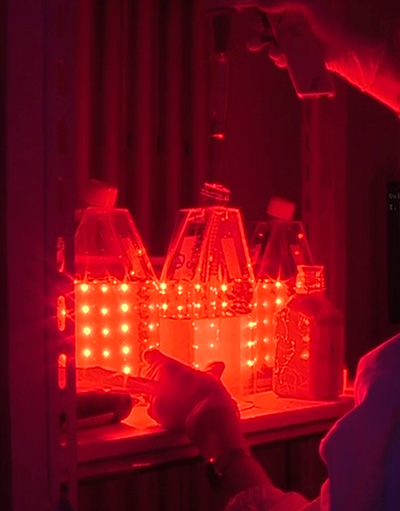
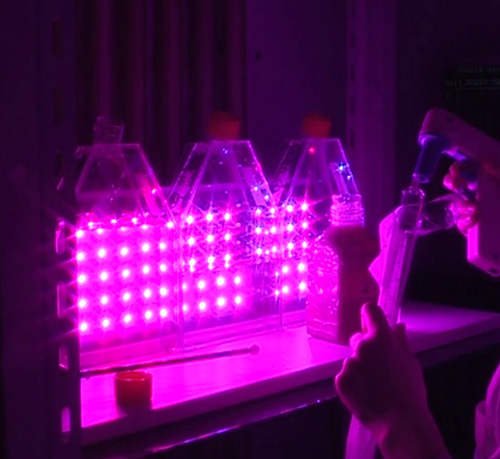

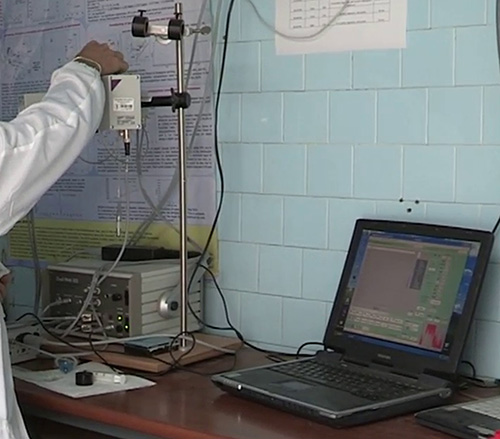
Responsible: Maria Cristina Buia
Activities
The activities of this laboratory are characterized by the application of various and integrated approaches, classical and innovative, which are conducted in mesocosm/laboratory and in the field, to study the adaptive responses of benthic organisms (invertebrates and macrophytes), and their trophic interactions in relation with environmental factors and gradients, climate change and anthropogenic disturbances. The approaches used include the physiology of individual species, the structure of populations and the dynamics of benthic communities and coastal ecosystems, to identify early-warning signals/descriptors at different level of biological complexity, and finalized to a correct management and conservation of the coastal systems and their biodiversity.
Systems for laboratory experiments
- System for automatic culturing of model organisms.
- Thermostatic chambers for rearing and experiments of benthic organisms in axenic conditions.
- Tanks for maintenance and experimentation of benthic organisms in sea-water open systems.
Analysis
- Qualitative and quantitative analyses of benthic samples deriving mainly from hard and soft bottom vegetated habitats, and soft sediments within the continental shelf.
- Biometric and biomass analyses.
- Biological assays and test for bioactive substances.
- Sample preparation for elemental analyses, and for observation at the scanning and transmission electron microscopy.
- Measurements of environmental variables (Temp., pH, irradiance, dissolved oxygen).
- Measurements of photosynthetic efficiency in macrophytes.
Instrumentation
- Stereomicroscopes, optical microscopes, inverted optical microscope.
- Freezer at -20 °C and refrigerators +4 °C.
- Laminar flow flume and chemical flume.
- Thermostatic cells and chambers.
- Autoclave, ovens, muffle.
- Filtration system.
- Spectophotometer.
- Analytical and technical balance, microbalance.
- Deionizer.
- Liofilizer (deep-dryer).
- Laboratory oxymeter and pH-meter, portable pH-meter.
For scientific underwater use and diving:
- Cameras and video-cameras with underwater dedicated casts.
- Diving-PAM, pH-meters, quantameter, multi-parametric probes.
- Grabs, dredges, corers for sediment and benthos, air-lift sampler, hand-towed net and plankton nets.
Coordinator: Gabriele Procaccini
Scientific activities
Strumentazione di base per la biologia molecolare (PCR, centrifughe, apparati elettroforetici, transilluminatore, bagni termostatici, spettrofotometro, fluorimetro, pH-metro, bilancia di precisione)
Gene gun (apparecchio per la trasformazione biolistica)
In the laboratory of Molecular Ecology and Functional Genomics we carry out studies addressing ecological questions, using molecular approaches. The laboratory covers research activities ranging from molecular phylogeny and taxonomy to phylogeography and population genetics, using sequence analysis and analysis of polymorphic markers, such as microsatellites and SNPs. It also deals with the study of gene function through functional genomics approaches and reverse genetics (mainly production of transgenic lines of diatoms). We also makes use of analysis of environmental genomics and comparative transcriptomics, and we carry out gene expression studies in natural and controlled conditions (RNA-Seq, RT-qPCR).
Experimental systems
- Mesocosms for maintaining benthic organisms under controlled conditions.
- Walk-in chamber for microalgal cultures.
Analysis
- DNA extraction, purification and quantification.
- RNA extraction, purification, quantification and reverse transcription.
- Protein extraction and quantification.
- Sample preparation for RT-qPCR in plates.
- Samples preparation for massive sequencing.
- Samples preparation for sequence analysis.
- Samples preparation for fragments analysis.
- single and multiplex PCR.
- Electrophoresis on agarose and acrylamide gel.
- Statistical analysis of population genetics and molecular phylogeny.
- Primers design, analysis of electropherograms.
- Cloning and bacterial transformation.
- Preparation of plasmid DNA (mini and maxi prep).
- Biolistic transformation and cultivation of GM crops.
- Algal cultures.
- Colorimetric assays with fluorescent vital dyes and microscopic analysis.
- Southern blot, Northern blot.
- Western blot and enzyme assays (colorimetric, ELISA).
- Use of specialized software for the analysis of protein and nucleotide databases and for the exploration of genomes.
Equipments
- Basic equipment for molecular biology (PCR, centrifuges, electrophoresis apparatus, transilluminator, thermostatic baths, spectrophotometer, fluorometer, pH meter, balance).
- Gene gun (apparatus for biolistic transformation).
- Hoods for algal cultures.
- Microscopes.
- Mixer Mill (Tissue Lyser).
- PC and software for molecular analysis.
- Fume hood.
- TurboGen (equipment for generating marine turbulence).
Responsible: Raffaella Casotti
Activities
The laboratory of Microbial Ecology carries on research on marine microorganisms (mainly diatoms and autotrophic/heterotrophic picoplankton) studying their diversity, activity and metabolic functions as well as their interactions with the environment, both physical-chemical and biological. The activities are held mainly by direct methods, that is, independent from cultivation, but monospecific cultures are also used to test specific hypotheses or further characterize microorganisms. The fields of activity cover the biological oceanography, ecophysiology and marine ecology in general.
The laboratory also implements the technical and instrumental approaches for the study of microorganisms, mainly as regards the use of flow cytometry for the monitoring of marine plankton and for the development of early warning systems for biological environmental risk.
Experimental systems
- Thermostated cabinets for growing microalgae and bacteria under controlled light and temperature conditions.
- Tanks for experiments on board ships or outdoors for incubations and manipulations of natural plankton communities.
Analysis
- Counts and measurements of optical parameters (scatter and fluorescence) on cells and unicellular organisms by flow cytometry and epifluorescence microscopy.
- Estimates of growth rates and grazing of picoplankton.
- In situ hybridization with oligonucleotide probes for the characterization of bacterial communities.
- Estimates of DNA content of algae and cell lines by flow cytometry (including dynamics of the cell cycle).
- DNA and RNA extraction for metagenomics and metatranscriptomics.
- Analysis of cellular concentrations of picophytoplankton with scanning flow cytometers at high frequency in both laboratory and on board boats.
- Analysis of concentrations and cellular properties of marine bacteria with prototype automatic coloring module.
Instrumentation
- Conventional flow cytometry.
- Scanning flow cytometer with automated sampling module.
- Laminar flow hood.
- Thermostated cabinets for algal and bacterial cultures.
- Epifluorescence microscope with camera.
- Basic instrumentation for laboratory (centrifuges, thermostated baths, pHmeter, filtration rigs, sonicators, refrigerators and freezers).
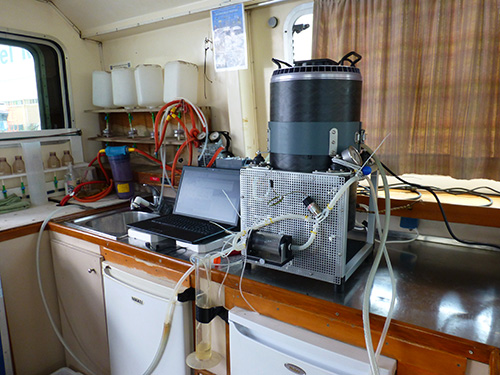

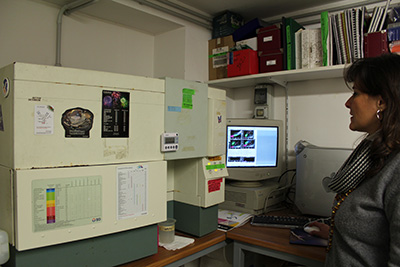
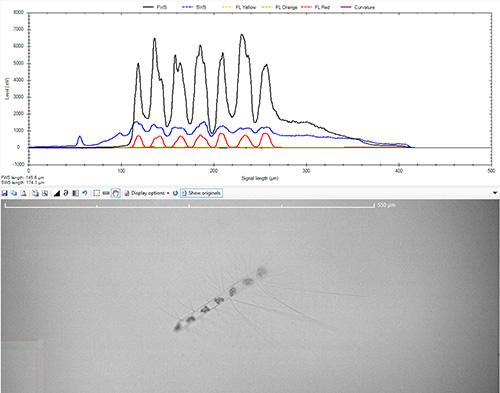
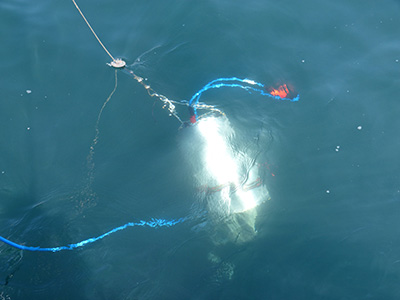
Coordinator: Daniele Iudicone
Activities
The aim of the laboratory is to support the study of the ecology of marine plankton and of the ocean physics that is relevant for the plankton ecology. The laboratory of ecological modeling has as main activity the preparation and realization of numerical simulations of the ocean circulation at microscale (DNS), mesoscale (ROMS) and at global scale (NEMO) and of the associated plankton dynamics. The activities are integrated with statistical analysis of environmental (physicochemical) data, ecological (populations) data and biological (metagenomics, functional parameters) data.
Experimental systems
- In-house configurations of numerical codes for simulating the ocean circulation, the fluid dynamics at the microscale (turbulence) and the impact on microorganisms.
- In-house configurations of numerical codes for simulating planktonic populations at different levels of complexity.
- Turbulence Profiler.
- Devices for the production of marine turbulence in lab (TurboGen).
Analysis
- Analysis of the variability of the ocean physics (including thermodynamics) and biochemistry at various spatial and temporal scales at basin and sub-basin scales.
- Statistical analysis of environmental data and ecological.
- Water mass thermodynamic budgets.
Instrumentation
- Servers and computers for numerical simulations.
- Software for data analysis.
- Software for the simulation of the physics and biology of marine organisms (produced in-house or by external collaborators).












